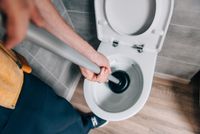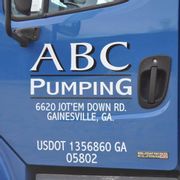Do’s & Don’ts of Clearing Drains When You Have a Septic System
By ABC Pumping

Blocked drains are the bane of waste disposal systems. When they happen, the first recourse of most people is to pour cleaners down the drain to remove the clog. This method, however, does more harm than good, particularly if you have a septic system; harsh chemicals can imbalance the bacteria levels in your septic tank. Avoid costly repairs in the long run with a few of these helpful guidelines when clearing out your drains.
Do
Ensure that you have a clogged drain.
Clogs usually happen in the kitchen and bathroom sinks because of frequent, heavy usage. When they appear to drain slower than usual, it can be due to a localized blockage or widespread problem. The most common cause of clogging in kitchen sinks is food debris; for bathrooms, it’s often loose hair or soap scum. If clogging appears in several plumbing fixtures and persists after a couple of attempts to fix, you might have a septic tank that’s at its limit or blocked main sewage line. In both cases, it’s best to call in a professional.
Call for repairs when sewage backups happen.
In a septic system, wastewater is designed to go down. But, when it starts to come up the drains, it’s high time to bring in a septic specialist. Avoid messy, waterlogged cleanups afterward by shutting off the water supply and minimizing usage until the issue is resolved.
Don’t
Use harsh chemicals.
Refrain from using liquid drain cleaners to clear out the blockage. Most of them contain corrosive chemicals that damage the pipes and kill bacteria in the septic tank, which can slow down the waste decomposition process. Instead, tap home remedies like boiling water, vinegar, and baking soda. Pour boiling water to dissolve any blockage; if it doesn’t work, pour half a box of baking soda down the drain, followed by a half-cup of vinegar. Leave it for 10 minutes or so before flushing the mixture out with boiling water.
For large-sized clogs, attempt to remove them by using a cup-shaped plunger. Fill the sink with enough water to create a firm suction of the plunger over the drain. With quick, sharp pumping motions, this will dislodge the blockage somewhere in the drainpipe.
Attempt to flush out the blockage.
 When removing the clog, aim to use as little water as possible. Refrain from running the tap for long periods, as this can cause more trouble with your septic system. This method is considered counterproductive, particularly if the issue is traced to a nearly full septic tank.
When removing the clog, aim to use as little water as possible. Refrain from running the tap for long periods, as this can cause more trouble with your septic system. This method is considered counterproductive, particularly if the issue is traced to a nearly full septic tank.
When blocked drains are giving you a hard time, count on the septic system professionals at ABC Pumping of Gainesville, GA. Serving the Hall County community, their team of professionals offers a full range of septic services—from inspection and maintenance to pumping and cleaning. Call (770) 889-4323 or schedule septic tank maintenance online.
About the Business
Have a question? Ask the experts!
Send your question

